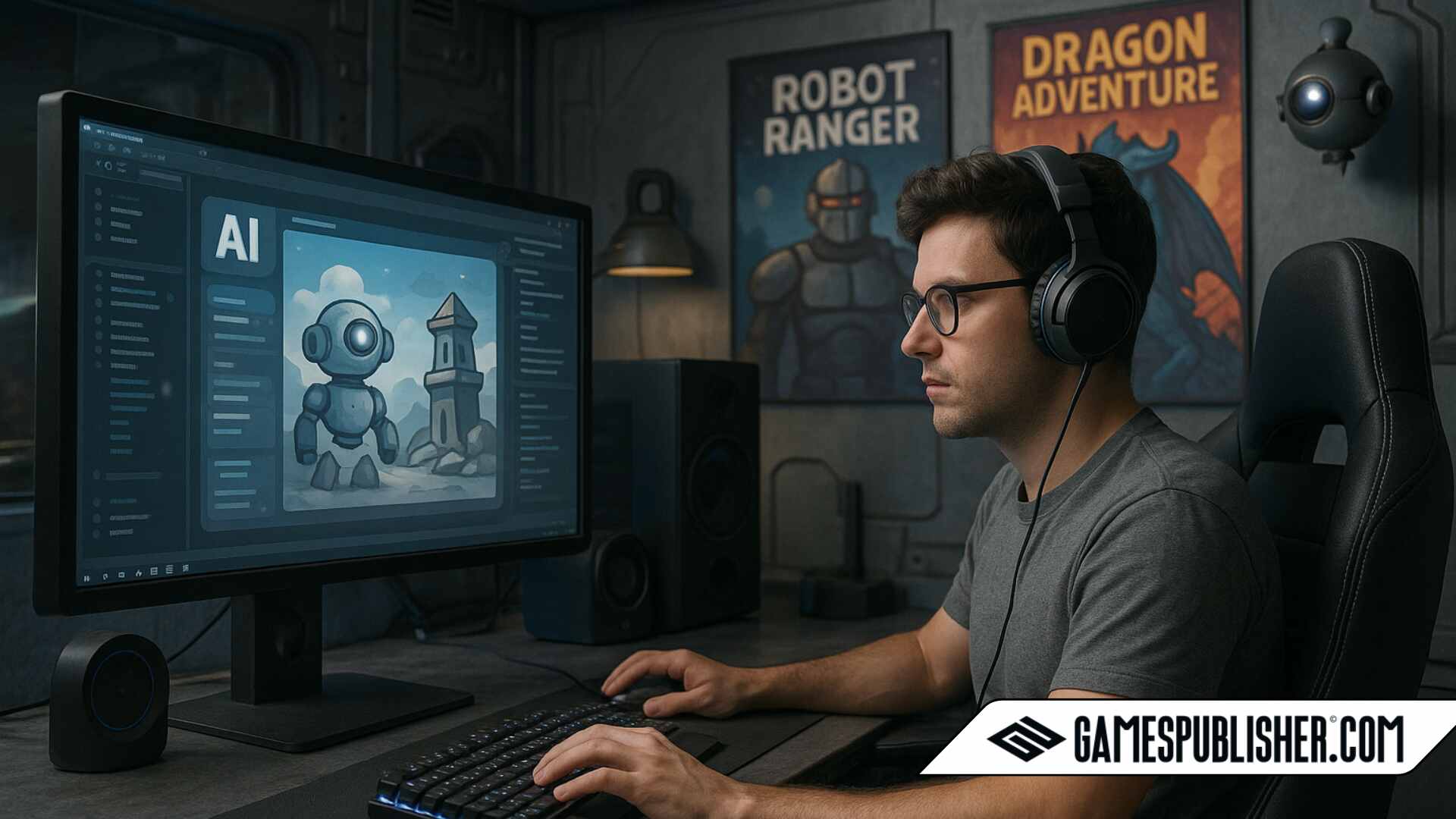In 2025, how to make games with AI is one of the most important skills for developers. Artificial intelligence has changed the way we design, build, and publish games. It helps developers save time, cut costs, and build better games faster. Whether you are an indie developer or part of a large studio, AI is now a key part of modern game development.
Tools powered by AI can now write code, design levels, create artwork, and build smart characters. The results are more creative games with less effort. Websites like Gamespublisher.com are great places for developers and publishers to stay ahead of these changes. They help you keep up with the newest tools, ideas, and trends in the gaming industry.
So, how can you take advantage of AI to build your next hit game? Let’s explore.
How to Make Games with AI in 2025 – The New Era of Development
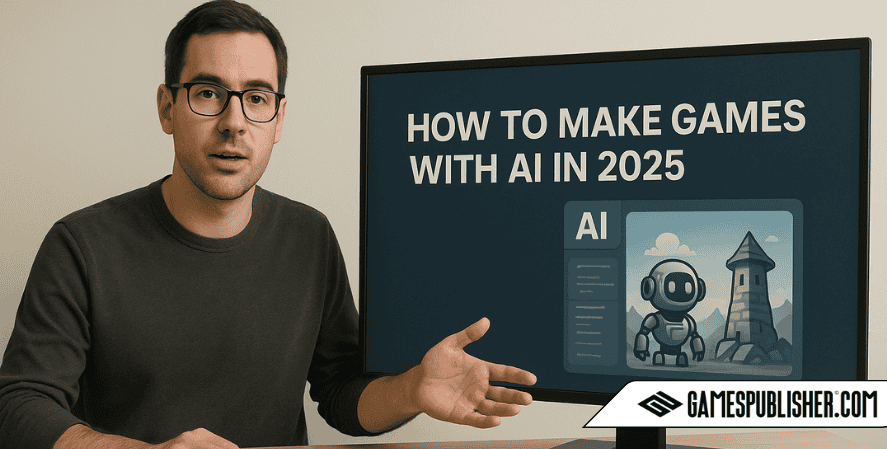
Overview of AI-Powered Game Development
Today, AI helps with almost every part of game making. Before AI tools, developers needed to complete most tasks manually. Now, AI tools assist with tasks like:
- Writing code automatically
- Creating artwork and 3D models
- Designing levels and missions
- Making smart enemies and NPCs
- Testing gameplay and fixing bugs
Because of these tools, you can learn how to make a game with AI without needing to be a coding expert. AI handles the heavy lifting, allowing you to focus on the fun parts—creativity and design.
The Benefits of AI in Game Creation
Using AI in game creation brings many benefits. Let’s look at some of the key advantages:
- Faster development: AI tools help you build games much quicker than before.
- Lower costs: You don’t need large teams. AI allows smaller teams or even solo developers to do more.
- More ideas to try: AI lets you test different game ideas and art styles in minutes.
- Smarter gameplay: With AI, you can create characters and stories that react to what the player does.
- Easier access: Thanks to AI, learning how to make a video game is now possible for anyone—even without coding skills.
Clearly, AI is changing the rules of game development, making it more open to everyone.
How to Make Games with AI Using No-Code and Low-Code Platforms
Best AI Tools for No-Code Game Creation
Thinking of making a game without any coding skills? That’s completely possible now. Several AI-powered tools now offer no-code or low-code solutions. These platforms make it easy to learn how to make games with AI without technical skills.
Here are a few of the most popular tools:
- Ludo.ai: Helps you come up with new game ideas using AI.
- Scenario.gg: Lets you make high-quality game art that fits your game’s style.
- Unity Muse: Assists with coding, UI, and content generation—all from simple prompts.
- Roblox Studio: Now includes AI features that help you write game logic and build experiences faster.
As a result, more people than ever can now build and launch games—even if they’re just getting started.
Building Prototypes and MVPs Quickly with AI
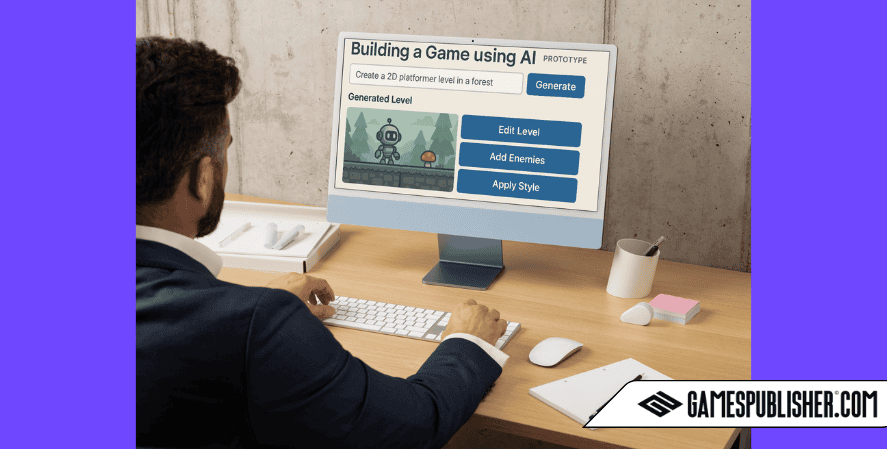
Building a game prototype used to take weeks or even months. But now, AI helps you do it in days. Here’s how:
- Use AI to build simple game levels
- Create basic enemies and characters
- Generate placeholder art and sounds
- Write quick dialogue scripts with AI tools
- Test the game using AI bots that simulate player behavior
This way, you can test your idea before spending lots of time and money. You can also share your MVP (minimum viable product) with friends, testers, or even early-access players.
How to Make Games with AI for Narrative and Dialogue Generation
Using AI for Dynamic Storytelling
Many gamers love story-rich games. By 2025, AI tools are speeding up narrative design and making it more interactive. For instance:
- Inworld.ai: Creates smart characters with memory, emotions, and personality.
- Charisma.ai: Builds branching stories where the player’s choices truly matter.
- NovelAI: Helps writers come up with lore, quests, or dialogue quickly.
These tools save time while keeping your game’s story deep and exciting. So if writing is not your strong suit, AI can help you bring your vision to life.
Integrating AI-Generated Dialogue into Game Engines
Once your dialogue is ready, it needs to be part of the game. Most engines support this easily. Here’s how:
- Unity: Use plugins or APIs to connect to Inworld or Charisma.ai.
- Unreal Engine: Use Blueprints or custom nodes to trigger dialogue.
- Web games: Integrate AI scripts using JavaScript or Python for text-based or visual novels.
Thanks to these tools, even smaller games can have lifelike characters and conversations.
How to Make Games with AI-Generated Art and Assets
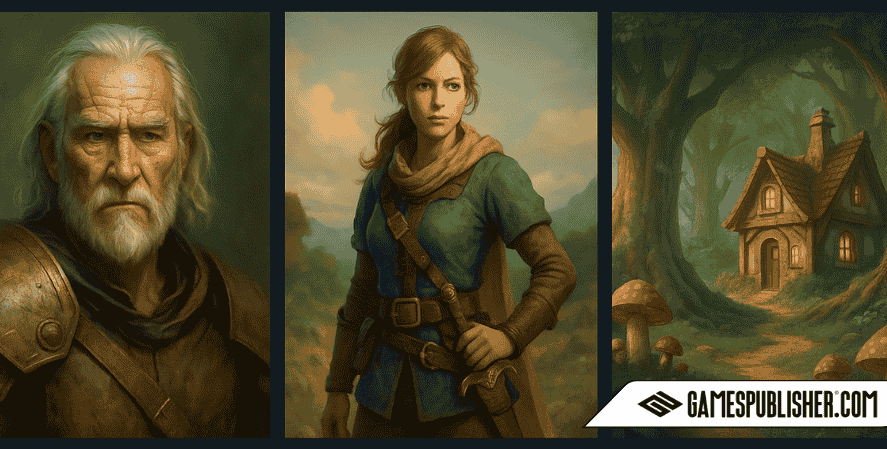
Creating Game Art with Generative AI
One of the hardest parts of how to make game assets is creating high-quality visuals. That’s where AI comes in. Here are some tools artists use in 2025:
- Midjourney: Great for concept art and unique visual styles.
- Leonardo.ai: Perfect for sprites, icons, and other in-game visuals.
- RunwayML: Builds 3D assets and background videos with ease.
You can describe what you want, and the AI gives you options to use, edit, or customize. This saves hours of work and allows more creativity during development.
Legal and Ethical Considerations in Using AI Art
Using AI art also comes with responsibility. Here’s what you need to know:
- Check licenses: Not all AI platforms let you use art in commercial games.
- Know the source: Some tools train on copyrighted work. Be careful to avoid IP issues.
- Be original: Don’t copy-and-paste AI results. Instead, use them as a starting point for your own unique creations.
With the expansion of the gaming world, regulations are also evolving. Make sure you build games that are both creative and legal.
How to Make Games with AI in Game Logic and Enemy Behavior
Smart NPCs and Enemy AI using Machine Learning
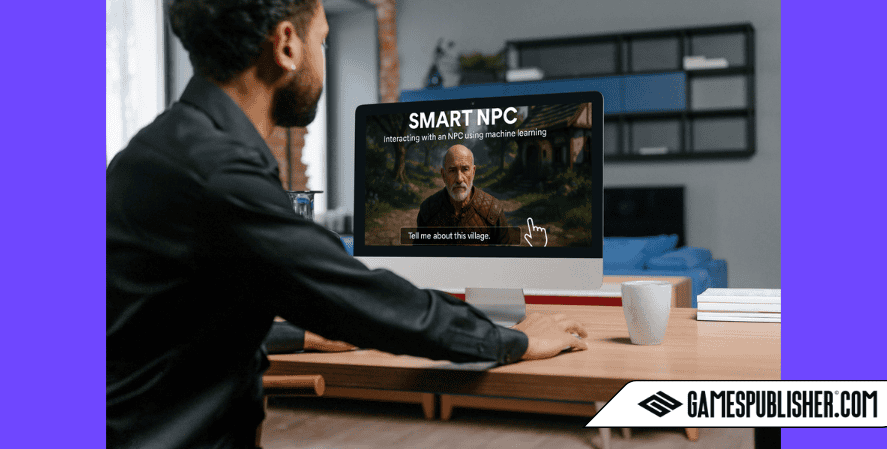
AI is great at making smarter enemies. In 2025, games use machine learning to:
- Adjust enemy behavior based on how you play
- Let NPCs learn and respond like real players
- Create team tactics and smarter reactions
Tools like Unity’s ML-Agents make it easy to train these models. As a result, your game can offer more challenge and more fun.
AI for Procedural Level and Content Generation
Games that generate content automatically are more replayable. AI helps with:
- Random level design in games like Minecraft
- Changing environments like in No Man’s Sky
- New dungeons or challenges every time you play
This means players stay engaged longer, which is great for retention and monetization.
How to Make Games with AI for Mobile and App-Based Experiences
Mobile AI Integration Tools for App Developers
Want to build a mobile game? AI makes that easier, too. Here are some mobile-ready tools:
- PlayableAI: Adds smarter NPCs and better gameplay tracking.
- Convai: Powers realistic conversations in mobile apps or games.
- Google Vertex AI: Adds powerful machine learning to Android-based apps.
Because of these tools, mobile games are becoming more advanced, even with smaller teams.
Monetizing AI-Enhanced Apps
AI also helps you earn more from your games. For example, you can:
- Show ads based on user behavior
- Offer personalized in-app purchases
- Run smarter A/B tests for features and pricing
These tools help you build games that not only play well but also perform well in the app stores.
Future Trends – Where AI is Heading in Game Development
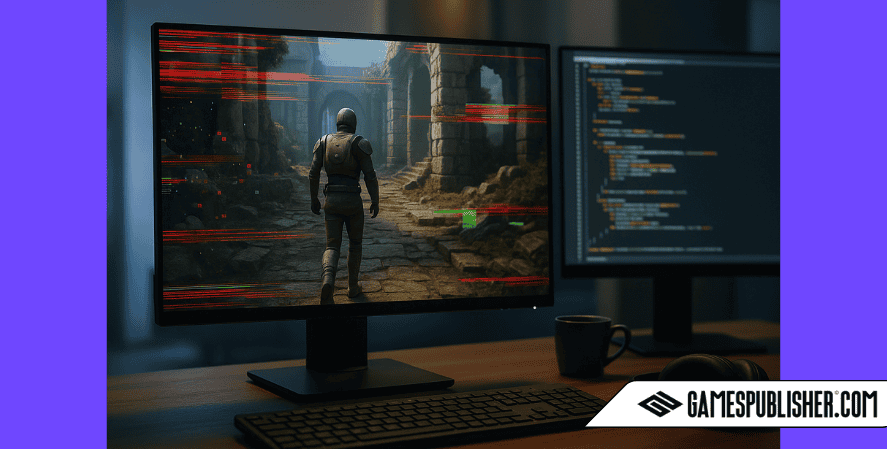
AI-Powered Game Testing and QA
Testing takes time, but AI helps speed things up. Tools now:
- Playtest your game for bugs
- Detect glitches and crashes
- Suggest balance changes and design fixes
Using these AI tools lets you release smoother, better-quality games.
Predictive Analytics and Player Modeling
Once your game is live, you need to understand your players. AI helps by:
- Tracking user behavior
- Predicting who might stop playing
- Making content updates that keep players engaged
These insights are powerful tools for improving both gameplay and revenue.
Conclusion
Now more than ever, knowing how to make games with AI is a must. From building art and levels to writing dialogue and testing gameplay, AI gives you the tools to do more with less. Whether you’re learning how to make a game for fun, for profit, or for a studio, AI can be your co-creator.
AI isn’t meant to take over your creativity—it’s designed to enhance and support it. With AI, your game can be smarter, faster, and more fun to build. Platforms like Gamespublisher.com will help you stay updated on the best tools, tech, and strategies for the future of gaming.
So, what will you create next?
Loading survey...

